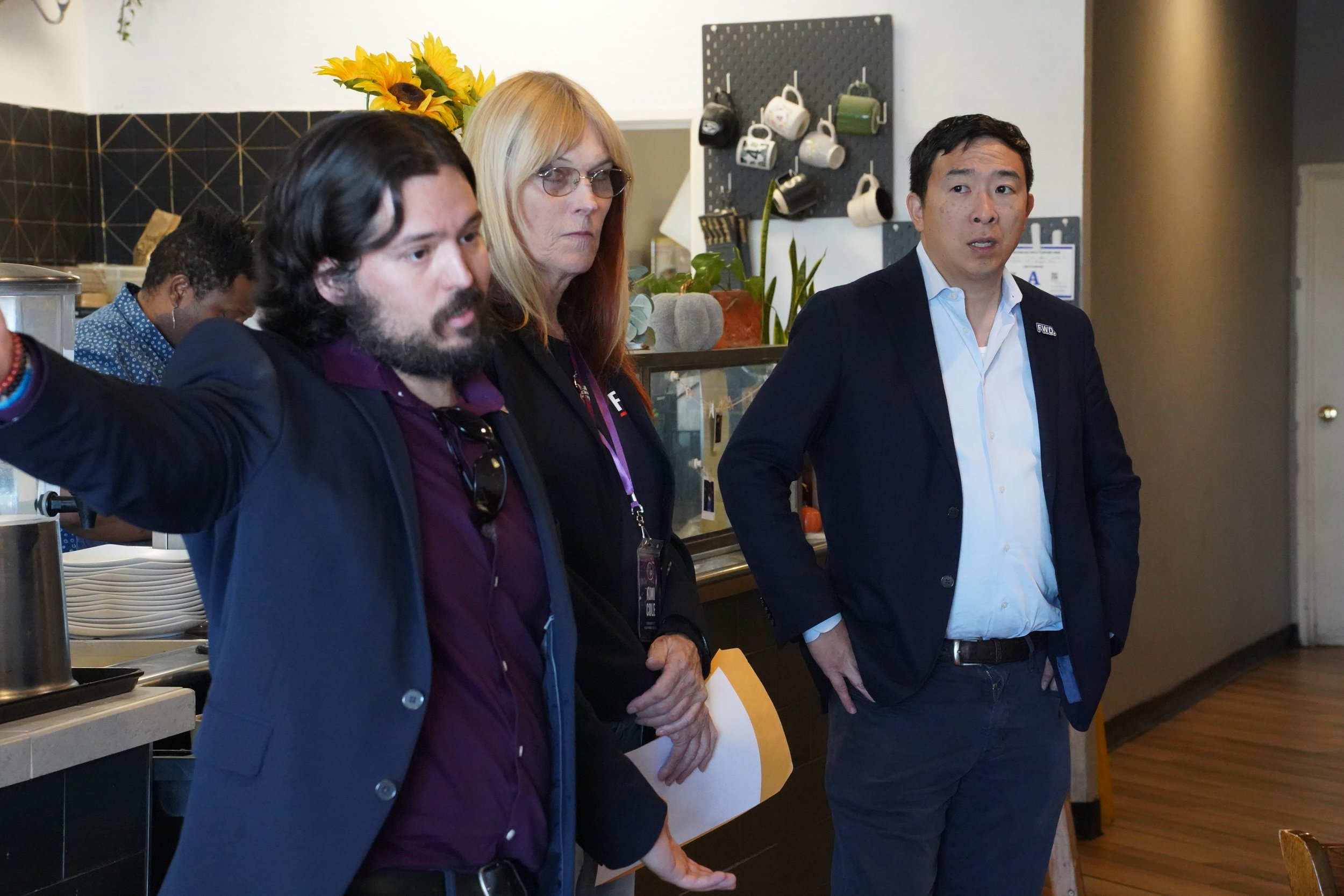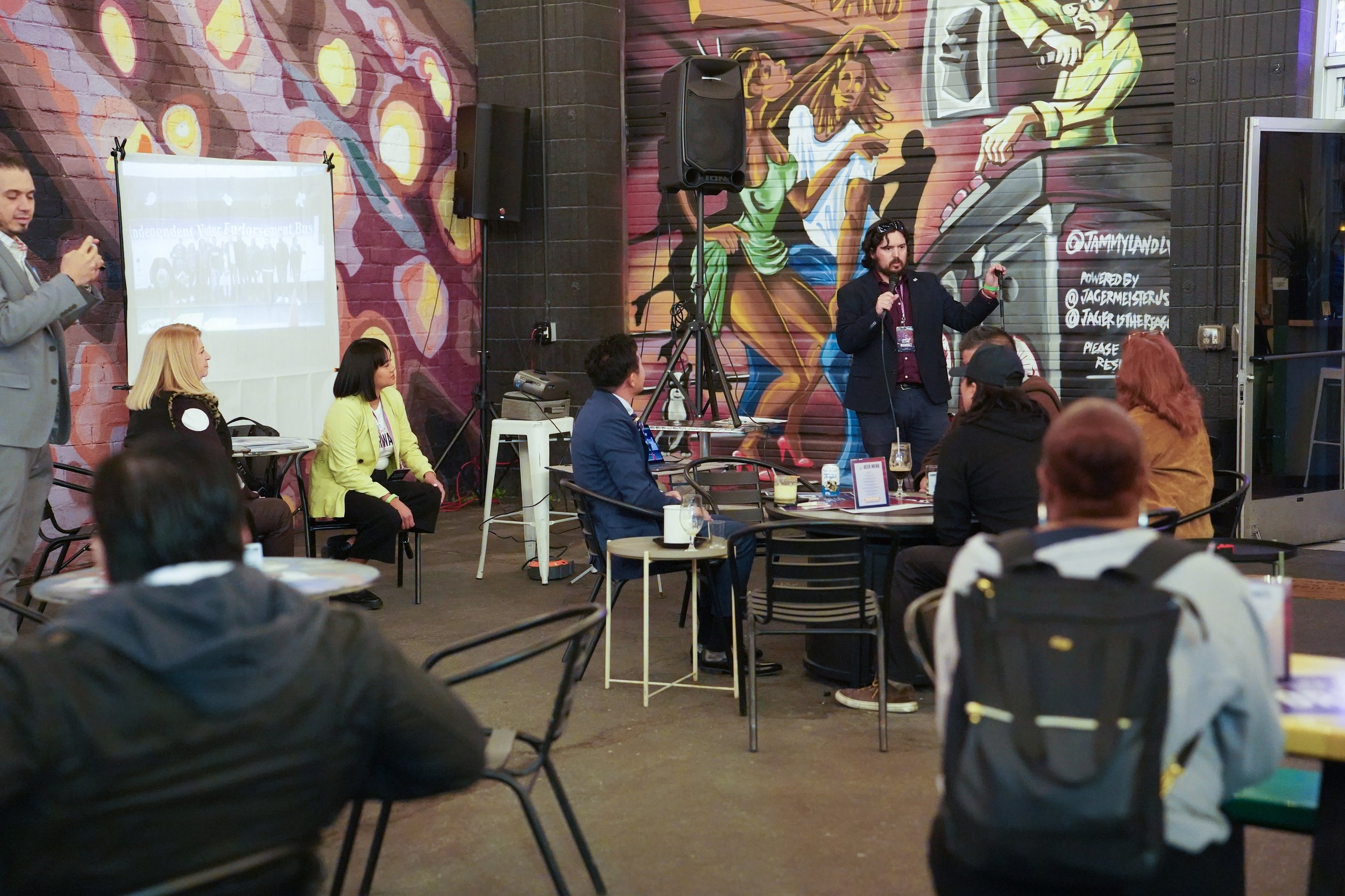Marquez recently stopped by the UNR campus to record a podcast episode with Our Town Reno.
Cesar Marquez, a 33-year-old native of Chicago with parents from Mexico, came to Northern Nevada five years ago with a background in industrial engineering to work for Tesla as a production supervisor.
His life has now taken a decidedly political turn, as he swapped electric car making at the gigafactory for chairing the Nevada Forward Party, part of the Andrew Yang-led initiative to think about politics differently.
Marquez also holds an instrumental role in the local “electoral reform space,” pushing for the once accepted ranked voting and open primaries ballot measure to make it through the Silver State a second, decisive time in 2024.
As in 2022, this November it will be Nevada Question 3 with a yes vote supporting “establishing open top-five primaries and ranked-choice voting for general elections, which would apply to congressional, gubernatorial, state executive official, and state legislative elections,” according to wording found on Ballotpedia.
Marquez uses a tee-shirt analogy to describe why he’s such a ranked voting enthusiast.
“When you wake up in the morning and you have to pick which shirt you're going to pick, I'm sure you have your first choice,” he explained during a podcast interview on the UNR campus.
“And if that one's dirty, then you pick your second choice. And if for some reason you can't find that shirt, then you go over to your third one. Right? And so picking a candidate is not much more different. The differences in this system versus the old one is that in order to win, you need a majority, 50% plus one. And so, the instant runoff, which is the same thing as a ranked choice voting, that's pretty much all it does. It just goes through a tabulation process that eliminates whoever got the least amount of votes, and then they get distributed to your second choice. And so you just go through that process, until you have somebody with the majority.”
Part of his advocacy took him to Wells Ave. to table during Dia de los Muertos.
In 2022, there was nearly 53% of the vote for yes on ballot question three, making Marquez confident it will go through again in its final round. “We’re trying to widen that margin in 2024,” he said. If these measures become reality, Marquez says “you're involving more people in the process. Their vote is more impactful, and people actually believe that it will make a difference.”
An early entry point into politics for Marquez was hearing Andrew Yang, the son of Taiwanese immigrants, making early splashes in the 2020 Democratic Party presidential primary with a signature proposed policy to establish a universal basic income to offset automation.
“[With] automation, artificial intelligence, we're going to decimate millions of jobs and a lot of folks [are] going to be displaced. And so the question is, well, what happens next? And so his solution was universal basic income, which I really thought was a good idea. Since then I kind of started getting involved in his campaign, and once he dropped out, I started to look at what are the things that I can do at the local level that are in my control, that are actually achievable.”
His social media feed has him pictured with other Yang supporters. “He brings in a lot of nerds and geeks, and just good kinds of people who want to do something for their communities,” Marquez said of his newfound activism.
He is now Yang’s handler whenever he visits Nevada. The Forward party was started in 2020 by Yang and former New Jersey Republican Governor Christine Todd Whitman, and is preparing a few candidates here and there in 2024, but not for the U.S. presidency.
“It’s more likely that someone like Andrew would draw votes away from Biden or something like that. And one of our missions is that we want to make sure [former President Donald] Trump doesn't get elected. That’s one thing about the Forward Party is that we draw a hard line against extremism.”
Marquez at a political event on left of photo, with Yang on right.
Marquez says most Americans are tired of both major parties and the two likely candidates, with President Joe Biden having such low favorability polls and Trump so many indictments to face.
“We have a government that is not accountable to the people, that is not solving their issues,” Marquez added. “They're fighting other things to kind of argue about. And I think if you just talk to most Americans, they're tired of it, right? They want a government that works for them.”
With a block of just 20-thousand voters he says the Forward Party could become a power broker in a competitive purple state such as Nevada. “If you look at 22, for example, [Republican] Governor [Joe] Lombardo won with 15,000 votes. [Democratic] Senator Catherine Cortez Masto won with like 8,000 votes, right? And so the question I ask people, well, what happens if you get a voting block of 20,000? What are the other parties going to have to do in order to get that voting block? And so I think almost instantly we can bring both parties to the table and say, ‘hey, these are, our demands for things to get done. And if you don't do it, then, you know, we'll see which side does.”
The latest Nevada data has 33% of active registered voters listed as nonpartisan, nearly 31% as Democrats and close to 29% as Republicans. The others are members of the Independent American Party, Libertarians or part of other minor parties.
Wikipedia defines the Forward Party as centrist which is not a word Marquez uses himself very much.
“I think at this point everybody may have a different definition of what centrist means,” he said. “The way I describe the party is like, we're not ideological. We bring people who are progressives, moderate Republicans, libertarians, but I think if you just think in terms of like left right then yeah, I'm sure, we probably fall more in that centrist space.”
At the state level one candidate running for the state senate who identifies as a “Forwardist” is Gregg Taylor, whose X feed is populated with posts about Yang.
Taylor also wrote this in November: “Last weekend, I spoke with more than 20 mom & pop business owners in North Las Vegas. I wonder what they could do with the $380M legislators are giving the billionaire Oakland A’s owners. We can do MUCH better. I’m running for State Senate (D1). Do You Have the Courage to Change?”
In the run-up to voting, Marquez plans on tabling at the UNR campus to get students to vote yes on ballot question three and also get to know the Forward Party.
“Our message is resonating, especially with young people who feel that they don't have much representation. And you know, what I tell them is that, ‘hey, instead of arguing with the two parties, come build something positive with us.’ And hopefully as more and more people start paying attention to politics and see the work that we've been doing for the last couple of years, I think there's going to be a lot of interest in what we're doing,” he said. “That's just one of my personal goals is to get people more civically engaged.”
Marquez has proven to be a natural in political organizing, after leaving his job at Tesla.
The Forward Party abandoned early ideas of a national platform so that local chapters could be more flexible to meet local needs on hot button issues and other matters, but early positions before there was a merger with the Serve America Movement and the Renew America Movement are indicative of which types of candidates might be interested in running for the Yang team.
These included calling for term limits for members of Congress, a new Department of Technology, establishing data as a property right and an economy based on human-centered capitalism.
Once ranked voting and open primaries are established in more places for more elections, Marquez believes it will give more of a chance to forwardist candidates to win local, state and national elections, so they can implement results-driven ideas and manage both big picture and daily problems we collectively encounter.




